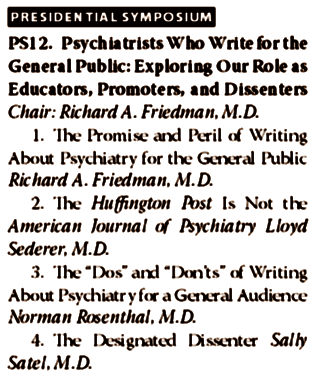 Scanning through the preliminary program for next month’s APA Convention in San Francisco, I ran across the Presidential Symposium above. One doesn’t have to ponder very long to figure out who
Scanning through the preliminary program for next month’s APA Convention in San Francisco, I ran across the Presidential Symposium above. One doesn’t have to ponder very long to figure out who is the target of was the stimulus for this symposium – Dr. Allen Frances and some others of us who are lesser irritants. From the titles, I expect that they are going to suggest some kind of code of conduct for writing in the media, rather than recognize that all their critics did was let the cat out of the bag..
Setting the Record Straight: A Response to Frances Commentary on DSM-V
Psychiatric Times
By Alan F. Schatzberg, James H. Scully Jr, David J. Kupfer, Darrel A. Regier
July 1, 2009The commentary “A Warning Sign on the Road to DSM-5: Beware of its Unintended Consequences” by Allen Frances, M.D., submitted to Psychiatric Times contains factual errors and assumptions about the development of DSM-V that cannot go unchallenged. Frances now joins a group of individuals, many involved in development of previous editions of DSM, including Dr. Robert Spitzer, who repeat the same accusations about DSM-V with disregard for the facts.
Finally, Dr. Frances opened his commentary with the statement, “We should begin with full disclosure.” It is unfortunate that Dr. Frances failed to take this statement to heart when he did not disclose his continued financial interests in several publications based on DSM-IV. Only with this information could the reader make a full assessment of his critiques of a new and different DSM-V. Both Dr. Frances and Dr. Spitzer have more than a personal “pride of authorship” interest in preserving the DSM-IV and its related case book and study products. Both continue to receive royalties on DSM-IV associated products. The fact that Dr. Frances was informed at the APA Annual Meeting last month that subsequent editions of his DSM-IV associated products would cease when the new edition is finalized, should be considered when evaluating his critique and its timing.
… In 2008, Senator Grassley zeroed in on possible conflicts of interest involving Dr. Schatzberg’s grant from the National Institute of Mental Health [NIMH, which is a part of NIH] to study mifepristone as a possible treatment for depression. While overseeing this research, Dr. Schatzberg owned millions of shares in Corcept Therapeutics, a company that was attempting to get mifepristone approved by the FDA to treat depression. “Dr. Schatzberg carries an equity interest in Corcept with over 2 million shares of stock,” Grassley explained in a letter to Stanford President John Hennessey. “For instance, as of January 31, 2008, he reported to the SEC that he held 2,438,749 shares of Corcept stock, with sole voting power for 2,738,749 shares. On June 12, 2008, Corcept stock closed at $2.24 a share, meaning that his stock is potentially worth over $6 million.”
Dr. Schatzberg himself sent a letter in September 2008 to the members of the American Psychiatric Association, an organization that had recently elected him as president, to address the “misperceptions and false statements” about his research and ethics. In that letter, Dr. Schatzberg characterized Grassley’s investigation of his taxpayer funded research and millions of shares in Corcept Therapeutics as an “attack.” “Being attacked for doing good by those on the outside is something we must all combat with facts as I have in this letter and as Stanford has through its responses to the Senator,” wrote Dr. Schatzberg. He continued, “but we must also recognize and confront that we have our own internal destructive elements both in our profession and in our organization.” …
New Emphasis on Medico-Physiological TheoryAdvances in neuroscience, genetics, and psychophysiology have greatly enhanced our understanding of psychological distress. The neurobiological revolution has been incredibly useful in conceptualizing the conditions with which we work. Yet, even after “the decade of the brain,” not one biological marker [“biomarker”] can reliably substantiate a DSM diagnostic category. In addition, empirical studies of etiology are often inconclusive, at best pointing to a diathesis-stress model with multiple [and multifactorial] determinants and correlates. Despite this fact, proposed changes to certain DSM-5 disorder categories and to the general definition of mental disorder subtly accentuate biological theory. In the absence of compelling evidence, we are concerned that these reconceptualizations of mental disorder as primarily medical phenomena may have scientific, socioeconomic, and forensic consequences. New emphasis on biological theory can be found in the following DSM-5 proposals…
The definition of a mental disorder that is contained in DSM-IV is also undergoing a thorough review by the Task Force, which has not adopted the proposed revision that was published by Stein et al. in Psychological Medicine. There is certainly no intent on the part of the DSM-5 Task Force to diminish the importance of environmental and cultural exposure factors as etiological contributors to mental disorders — as indicated by an active study group charged with developing a cultural formulation section as well as culture specific expression issues for individual diagnoses. We should also note that the DSM-5 Task Force and Work Groups include a multidisciplinary mix of clinical and research experts in which psychologists are prominent members. There is also another field trial taking place in Routine Clinical Practice settings that will include psychiatrists and approximately 500 of each mental health specialty group of psychologists, social workers, psychiatric nurses, clinical counselors, and marriage and family counselors. The full range of disorders will be assessed in this field trial and the findings will contribute to the final decisions about the diagnoses…
 So now we have a Presidential Symposium that is surely directed towards all the criticism they’ve received for this DSM-5 effort – one that was planned at the apogee of a wave that they failed to see collapsing around them as the years passed. Dr. Frances and others may have had a kindling role in the firestorm that followed, and the fact that overmedication and overdiagnosis of psychiatric disorders is on the front page of newspapers all over the country [where it belongs], but the responsibility rests clearly in the offices of the American Psychiatric Association. All the cliches fit, eg attacking the messenger, the ad hominem fallacy, talking down to rather than with, etc. This Symposium just adds insult to injury and there’s zero chance that it’s going to put the cat back in the bag.
So now we have a Presidential Symposium that is surely directed towards all the criticism they’ve received for this DSM-5 effort – one that was planned at the apogee of a wave that they failed to see collapsing around them as the years passed. Dr. Frances and others may have had a kindling role in the firestorm that followed, and the fact that overmedication and overdiagnosis of psychiatric disorders is on the front page of newspapers all over the country [where it belongs], but the responsibility rests clearly in the offices of the American Psychiatric Association. All the cliches fit, eg attacking the messenger, the ad hominem fallacy, talking down to rather than with, etc. This Symposium just adds insult to injury and there’s zero chance that it’s going to put the cat back in the bag.

Remind me… who is the incoming president of the APA? I don’t have the foggiest idea. I guess that speaks to the perception that this organization has made itself irrelevant to most psychiatrists. So, it’s less a matter of dissent than of dismissing them. By the way, they don’t own psychiatric diagnosis and classification, though they like to throw their weight around as though they do.
“Managed Care” has also contributed to heavy reliance on diagnoses that insurance companies will pay for; but wouldn’t it be nice— instead of people being saddled with labels they can’t get rid of, and being seen for 15 minutes to get a prescription for their brain— if psychiatry stopped and asked themselves what they’re doing to their patients in order to get paid? If anyone has the power to challenge the institutions of Managed Care and insurance companies, and to rally patients behind that effort it’s medical doctors.
Psychologists have been driven to near professional extinction by these forces. Any psychiatrists feeling vindicated by that should turn around and look at the GPs and prescribing nurses behind them.
Seems to reinforce my position that APA leadership is rampant with narcissism and antisocial qualities. The gall, or moreso the projection of the man to accuse Frances of the very things he has done. And, also solidifies my low opinion of membership.
Can Frisco hold all that ego mass descending on the city next month!?
Cute cat. Putting the cat back in the bag?
Oh, we have plenty of egos in Frisco. The psychiatrists are small potatoes.
Code of conduct, or code of silence? Maybe it’s “omerta” they would like to see govern the APA, as in so many successful Outfits.
From Dr. Lloyd Sederer of “The Huffington Post is not the American Journal of Psychiatry”:
http://www.huffingtonpost.com/mobileweb/lloyd-i-sederer-md/lets-not-get-too-depresse_b_452599.html
From Dr. Satel of the Anerican Enterprise Institute:
http://www.newrepublic.com/book/review/drugs-and-money
On the other hand you have this:
http://www.nejm.org/doi/full/10.1056/NEJMp1201794
I love this blog, so I am sure your failure to mention a symposium of interest at the APA is an accidental oversight. But you could take a look at a symposium titled “Pediatric Bipolar Disorder in its Historical Perespective: An Examination of Reasons for its Controversial Status” @Tues, May 21, 14:00.
It may be true that I have a conflict of interest–I’m the organizer of and a presenter in the symposium. But trust me, it’s good and will be good for you. Yours, Ed Levin
“It depends what you mean by efficacy”
How funny!
Duane
And it depends what you mean by “evidence-based” and “science” and “medicine”…
But of course if a person challenges psychiatry too much, they’re quickly labeled ‘anti-psychiatry’… or, falsely assumed a ‘scientologist’
Duane